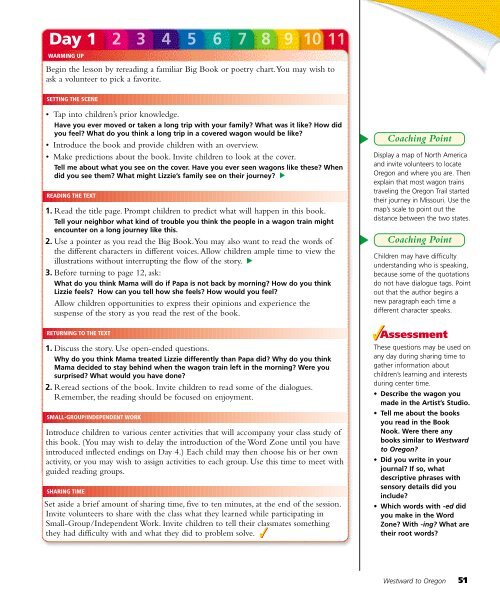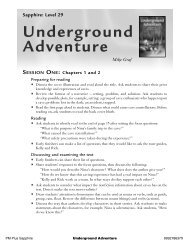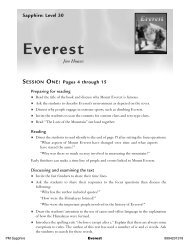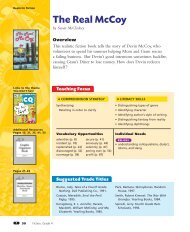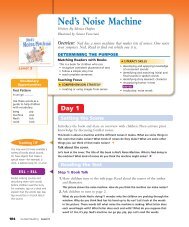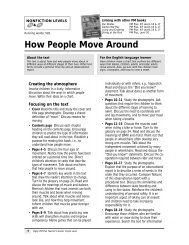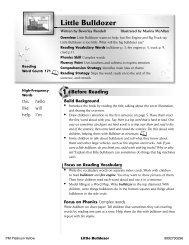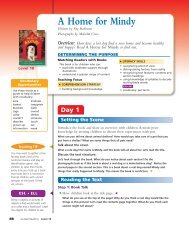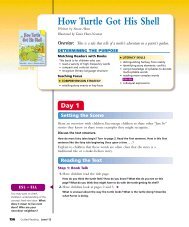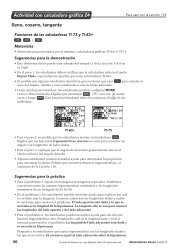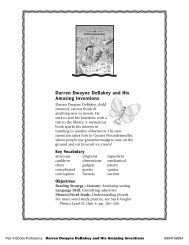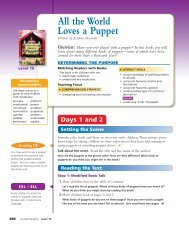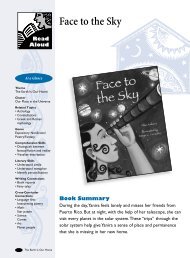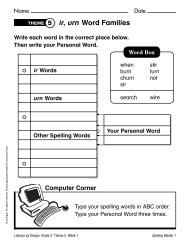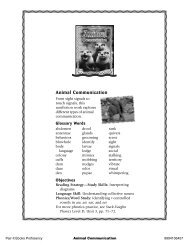Westward to Oregon - Rigby
Westward to Oregon - Rigby
Westward to Oregon - Rigby
You also want an ePaper? Increase the reach of your titles
YUMPU automatically turns print PDFs into web optimized ePapers that Google loves.
Day 1 2 3 4 5 6 7 8 9 10 11<br />
WARMING UP<br />
Begin the lesson by rereading a familiar Big Book or poetry chart.You may wish <strong>to</strong><br />
ask a volunteer <strong>to</strong> pick a favorite.<br />
SETTING THE SCENE<br />
• Tap in<strong>to</strong> children’s prior knowledge.<br />
Have you ever moved or taken a long trip with your family? What was it like? How did<br />
you feel? What do you think a long trip in a covered wagon would be like?<br />
• Introduce the book and provide children with an overview.<br />
• Make predictions about the book. Invite children <strong>to</strong> look at the cover.<br />
Tell me about what you see on the cover. Have you ever seen wagons like these? When<br />
did you see them? What might Lizzie’s family see on their journey?<br />
READING THE TEXT<br />
1. Read the title page. Prompt children <strong>to</strong> predict what will happen in this book.<br />
Tell your neighbor what kind of trouble you think the people in a wagon train might<br />
encounter on a long journey like this.<br />
2. Use a pointer as you read the Big Book.You may also want <strong>to</strong> read the words of<br />
the different characters in different voices. Allow children ample time <strong>to</strong> view the<br />
illustrations without interrupting the flow of the s<strong>to</strong>ry.<br />
3. Before turning <strong>to</strong> page 12,ask:<br />
What do you think Mama will do if Papa is not back by morning? How do you think<br />
Lizzie feels? How can you tell how she feels? How would you feel?<br />
Allow children opportunities <strong>to</strong> express their opinions and experience the<br />
suspense of the s<strong>to</strong>ry as you read the rest of the book.<br />
RETURNING TO THE TEXT<br />
1. Discuss the s<strong>to</strong>ry. Use open-ended questions.<br />
Why do you think Mama treated Lizzie differently than Papa did? Why do you think<br />
Mama decided <strong>to</strong> stay behind when the wagon train left in the morning? Were you<br />
surprised? What would you have done?<br />
2. Reread sections of the book. Invite children <strong>to</strong> read some of the dialogues.<br />
Remember,the reading should be focused on enjoyment.<br />
SMALL-GROUP/INDEPENDENT WORK<br />
Introduce children <strong>to</strong> various center activities that will accompany your class study of<br />
this book. (You may wish <strong>to</strong> delay the introduction of the Word Zone until you have<br />
introduced inflected endings on Day 4.) Each child may then choose his or her own<br />
activity,or you may wish <strong>to</strong> assign activities <strong>to</strong> each group. Use this time <strong>to</strong> meet with<br />
guided reading groups.<br />
SHARING TIME<br />
Set aside a brief amount of sharing time,five <strong>to</strong> ten minutes,at the end of the session.<br />
Invite volunteers <strong>to</strong> share with the class what they learned while participating in<br />
Small-Group/Independent Work. Invite children <strong>to</strong> tell their classmates something<br />
they had difficulty with and what they did <strong>to</strong> problem solve. ✓<br />
✓<br />
Coaching Point<br />
Display a map of North America<br />
and invite volunteers <strong>to</strong> locate<br />
<strong>Oregon</strong> and where you are. Then<br />
explain that most wagon trains<br />
traveling the <strong>Oregon</strong> Trail started<br />
their journey in Missouri. Use the<br />
map’s scale <strong>to</strong> point out the<br />
distance between the two states.<br />
Coaching Point<br />
Children may have difficulty<br />
understanding who is speaking,<br />
because some of the quotations<br />
do not have dialogue tags. Point<br />
out that the author begins a<br />
new paragraph each time a<br />
different character speaks.<br />
✓Assessment<br />
These questions may be used on<br />
any day during sharing time <strong>to</strong><br />
gather information about<br />
children’s learning and interests<br />
during center time.<br />
• Describe the wagon you<br />
made in the Artist’s Studio.<br />
• Tell me about the books<br />
you read in the Book<br />
Nook. Were there any<br />
books similar <strong>to</strong> <strong>Westward</strong><br />
<strong>to</strong> <strong>Oregon</strong>?<br />
• Did you write in your<br />
journal? If so, what<br />
descriptive phrases with<br />
sensory details did you<br />
include?<br />
• Which words with -ed did<br />
you make in the Word<br />
Zone? With -ing? What are<br />
their root words?<br />
<strong>Westward</strong> <strong>to</strong> <strong>Oregon</strong> 51


